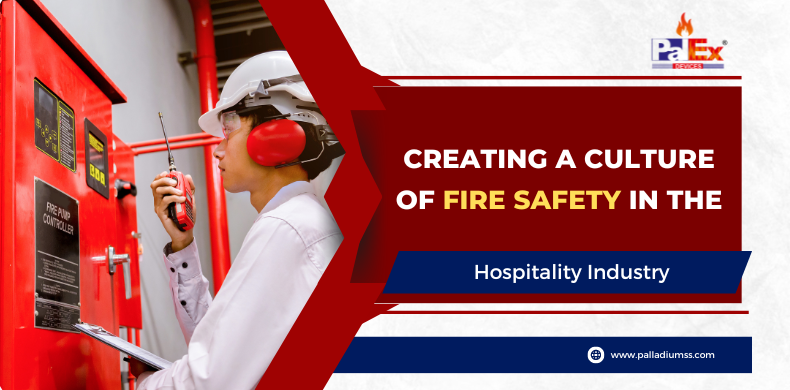A raging fire can engulf a hospitality business in minutes. Though flames may erupt suddenly, their aftermath burns for decades – scarring both structures and reputations beyond repair. Within the visitor economy, managers hold tremendous power to inflict or prevent such devastation. Their choices shape entire safety cultures across hotels, eateries, casinos, and event venues which see thousands pass through each day.
A singular negligent act can cause catastrophe, just as vigilance averts tragedy before the match strikes. That is why smart leaders obsess over fire preparedness. They embed it into staff habits with prevention policies, response drills, failsafe equipment, and relentless reinforcement. They accept that avoiding complacency requires eternal effort. By cementing a culture of readiness before the first wisp of smoke, hospitality stewards safeguard their patrons, properties, livelihoods, and legacies from licking flames.
Start with the Basics: Plans, Equipment, and Training
The first step is having comprehensive written fire safety plans that provide clear emergency response procedures for various fire scenarios. These plans should identify evacuation routes, establish responsibilities for different staff members, and ensure critical steps do not get missed. Plans must be accessible to all employees and included in new-hire training.
In addition to plans, hospitality businesses need fire detection and suppression equipment like smoke detectors, fire alarms, sprinklers, and fire extinguishers. Managers should document regular inspection and testing of these systems. Equipment should meet local codes and be suitable for each building’s size and floor plan.
Perhaps most importantly, hospitality staff at every level should undergo basic fire safety and response training. Employees should understand how fire spreads, know what to do when the fire alarm sounds, and practice emergency procedures. Only through repetitive drills and education can quick and effective actions become instinctual. Staff should also know how to safely evacuate people with disabilities.
Also read : Safeguarding India’s High-Risk Industries with Unparalleled Fire Safety Solutions
Focus on Prevention Through Design and Maintenance
While plans, equipment, and training prepare a hospitality business to respond to fires, the best approach is preventing fires in the first place. Hospitality managers can promote fire prevention by emphasizing it as they maintain their buildings and train employees.
For example, regularly inspecting electrical systems, kitchen equipment, and fireplaces allows staff to fix hazards before they turn into fires. Replacing outdated wiring and appliances reduces risk. Establishing no-smoking policies and rules about burning candles or incense removes common ignition sources. Even the type of furniture and decorations chosen for rooms can impact flammability.
In the kitchen, keeping cooking areas free of grease buildup and making sure equipment gets turned off prevents many fires. Loading dishwashers properly decreases electrical hazards. Banning unattended cooking helps, too. Other smart prevention strategies include providing guests with evacuation maps, installing plenty of exit signs, and fixing fire doors that do not fully close.
Learn from Experience Through Post-Incident Analysis
When fires do occur in hospitality establishments, managers should conduct a post-incident analysis to study what happened and improve for the future. Every detail of the emergency response should be scrutinized. Ask questions like:
- How quickly did staff detect the fire and activate alarms?
- How long did it take to evacuate or shelter in place?
- Were evacuation routes accessible and clearly marked?
- Did emergency communications channels work properly?
- What employee actions went well, and what could be improved?
- How effectively were people with disabilities assisted?
- Did fire doors, suppression devices, and other equipment operate as expected?
Documenting lessons learned after an incident, even a small one, allows continuous safety improvement. Further training and updated procedures may be warranted based on the analysis.
Empower Employees to Take Initiative
For a culture of fire safety to really take hold across an entire hospitality operation, employees at every level should feel empowered to take the initiative about emergency readiness. Management can encourage this by welcoming observations and ideas from staff.
For example, housekeepers who notice missing exit signs or blocked fire extinguishers during cleaning should feel comfortable reporting it. When the line cook has concerns about the kitchen exhaust system, there should be protocols for speaking up. If front desk clerks identify a safer evacuation route for guests, they should share it rather than stay silent.
Empowerment also means staff act proactively if they witness dangerous situations, like unsupervised candles or smoking inside. All employees need to take safety personally rather than assume someone else will handle it when staff are engaged like this, as extra eyes and ears, prevention, and readiness improve exponentially.
Make Safety Part of Your Brand Identity
Besides policies and equipment, a culture centered around fire protection is also about making safety intrinsic to a hospitality brand’s identity. When guests, employees, and the surrounding community view a venue as prioritizing emergency preparedness, it becomes woven into everyday operations.
Branding strategies that highlight safety include:
- Featuring fire protection in advertising and PR campaigns
- Using signage and decals to label exits, extinguishers, etc.
- Broadcasting fire safety tips on TV screens and brochures in guest rooms
- Partnering with local fire departments on community risk reduction initiatives
- Celebrating National Fire Prevention Week every October
- Securing industry certifications related to safety protocols
The more that fire safety is conspicuously built into the fabric of a hospitality establishment, the more it just becomes “part of the culture” over time. This prevents safety from ever slipping despite busy schedules and high turnover rates common across the hospitality sector.
Staying Prepared for the Worst
Creating and nurturing a culture of fire safety takes work, but it is essential for protecting hospitality businesses and their patrons. When staff maintains prevention mindsets, responds decisively to hazards, learns diligently after incidents, and integrates emergency readiness into everyday operations, they cultivate lifesaving vigilance. By making fire safety intrinsic to a hospitality brand’s culture, management keeps the unthinkable from becoming a reality.



